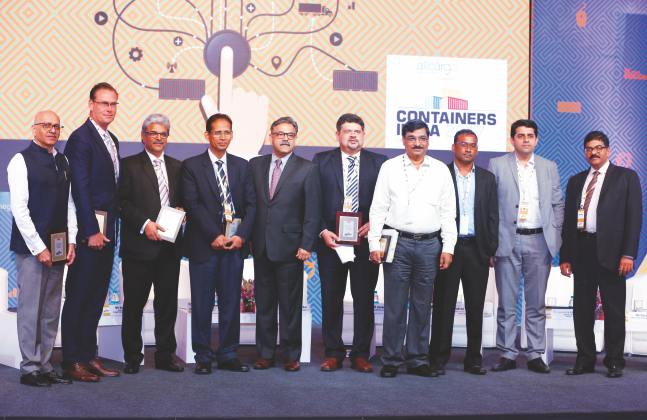[vc_row][vc_column][vc_column_text]
Digitalisation will bring down the transaction cost, remove duplication of data and help optimise the infrastructure use, improving the customer experience
Sabyasachi Hajara, Chairman, Editorial Advisory Board, Maritime Gateway, in his opening remarks talked about the improving situation in the maritime sector, growing consolidation and improving demand. “We should not only notice opportunities but also create them for the good of the industry and nation at large,” asserted Prakash Tulsiani, COO and Executive Director, Allcargo Logistics. His discussion touched upon development of infrastructure, Sagarmala and digitalisation in the industry. Ramprasad, Editorin- Chief, Maritime Gateway, and moderator of the session triggered the discussion with his comments on disruptions happening in the industry impacting the way business is done, importance of technology with more and more shipping lines going digital and Maersk investing in digitalisation while encouraging startups to develop and promote innovative ideas.
Digitalisation is impacting all industries and shipping is no different, said Sudeep Mehrotra, Director – Corporate Solutions Group, Alvarez & Marsal. It effects customer experience and helps in cost optimisation by reducing the number of layers in value delivery.
“Customers in the next five years will have better processes to get shipping services.” Dis-intermediation will be a major change and more customer information will let in evolution of new business models.
One of the largest promoter of digitalisation has been Inttra, automating documentation. Currently only 50 per cent of the industry is submitting documents electronically, informed John Vitkus, Vice President – Sales, Asia Pacific, Inttra Pvt Ltd. Inttra helps the industry to organise, collaborate operations, better share data.
Customers are demanding digitalisation as it increases transparency and decreases cost, revealed Purnendu Sekhar, Founder, CogoPort International Logistics. In other industries it is easy to calculate price, but in shipping it is not so simple. The entire industry should collaborate to make pricing more transparent and here technology steps in.
The Customs Department has been proactive in implementing digitalisation, remarked SK Rahman, IRS, Addl. Director General, Director General of Systems & Data Management, CBEC. The department has transformed from law enforcer to law facilitator. Measures such as self-assessment, AEO and ICEGATE have been implemented. Single Window Interface for Facilitating Trade is helping in coordinated border management. Another government initiative under digitalisation is the launch of Port Community System that integrates flow of information, said A Janardhana Rao, MD, Indian Ports Association.Under the system all processes that increase cost have been examined and digitalised. It has various modules: Vessels, Containers, Transport and Customs. Stakeholders include major and private ports, Customs, railways, shipping lines, agents and 14 banks.
Taking a macro view, Samir Shah, Chairman, FFFAI said, we need a cargo community system and not just port community system. The PCS has different module for air cargo, sea cargo and land cargo. These should be consolidated. Voicing the pain points he said, digitalisation has not reduced the cost for freight forwarders and spending per move has to come down.
Digitalisation started in the 80’s with the Customs department being one of the first implementers, revealed Sailesh Bhatia, MD, Bhatia Shipping Agencies. While shipping lines have moved from manual to digital filing of bills, but data is being used for internal use of the Customs department and shipping lines. “Digitalisation should move beyond data capturing to changing the way transaction is done.” PCS 2.0 should focus on incremental data and not repetition of data.
Surendra Lingareddy, Director, Asia-Pacific, Volteo, explained how IoT can help the industry perform better. Real-time tracking location and condition of trucks and containers will be possible. Sensor can help increase functioning of infrastructure at ports, reduce waiting time and detect anomalies.
[/vc_column_text][/vc_column][/vc_row]






